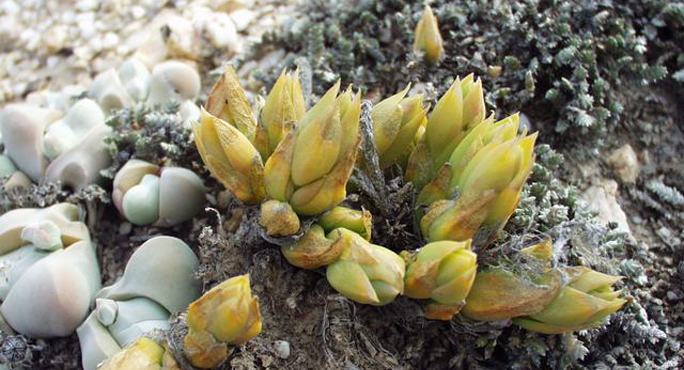Sceletium (Sceletium tortuosum) is called “Kanna,” by the native San people of South Africa
Among the many thousands of plants used medicinally around the world, about a hundred or so are mind and mood-modifying. Now, a plant from South Africa has made its way to North America, and it too promises significant mind enhancing effects.
Sceletium tortuosum, known by the native San people of South Africa as “Kanna,” enjoys a long history of native use – as early as 1662. The San people used to pick the plant, bury it to ferment it, then dry it. Once dried, sceletium was eaten, used as a snuff or even smoked, to produce its potent effects. The plant was also sometimes used as currency.
A good way to describe the effects of sceletium is through a simple metaphor. Think of your mind as a reasonably well-tuned four cylinder engine. About half an hour after consuming between 50 - 100 milligrams of sceletium, your mind is more like a twelve cylinder, turbo-charged racing engine. Soon your mind is overcome with startling clarity, a feeling that anything is possible, and a seemingly endless capacity for ideas and mental work. If coffee is a pick-me-up, sceletium is a jet ride to mental brilliance.
The staggering effects of sceletium seem primarily due to a group of alkaloids, notably mesembrine, mesembrenol and tortuosamine. These compounds interact with receptors in the brain, enhancing the production of dopamine, which is our primary inner pleasure chemical, and prolonging the activity of serotonin, a critically important mood compound. The net effect of sceletium ingestion is a feeling of tremendous well being, heightened awareness, mental alertness and a keen-mindedness that is quite pronounced.
But there is far more than just a feel good effect and terrific mental stimulation to sceletium. The plant appears to be a first-rate anti-depressant and anti-anxiety aid. It could potentially be used by people with low mental energy, mild-to-moderate depression and anxiety disorder.
In one study of the effects of sceletium reported in the Journal of Ethnopharmacology, the main alkaloids of the plant demonstrated the capacity to extend the activity of serotonin. This activity, known as SSRI, or selective serotonin reuptake inhibition, is essentially how pharmaceutical antidepressant drugs work. The difference with sceletium is that it is a multi-compound plant and does not appear to demonstrate comparable hazardous effects of antidepressants, which can include gastrointestinal disorders, loss of sex drive, insomnia and exacerbated depression.
One major difference between sceletium and other agents used to manage depression or anxiety is that sceletium is available as an herbal supplement and does not require a prescription. Most people tolerate sceletium well, although there are some reports of mild headaches among users.


